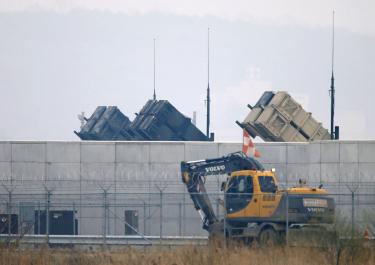North Korea told Russia yesterday to consider evacuating its embassy in Pyongyang, as reports suggesting the North was preparing an imminent missile launch prompted a fresh spike in global concern.
An embassy spokesman told Russian news agencies that the North Korean foreign ministry had suggested they “examine the question of evacuating employees” from the mission.
The spokesman said he believed a similar suggestion had been made to other diplomatic missions in the capital.
North Korea, incensed by UN sanctions and South Korea-US military drills, has issued a series of apocalyptic threats of nuclear war in recent weeks, and international concern that the situation might spiral out of control is clearly growing.
UN Secretary-General Ban Ki-moon described the daily threats from Pyongyang as “really alarming and troubling” and Germany summoned the North Korean ambassador to convey Berlin’s “serious concern.”
Philippine Foreign Secretary Albert del Rosario said he was flying to Seoul today and would “fully vet” contingency plans for ensuring the safety of 43,000 Filipino workers in South Korea.
The spike in tensions came as Yonhap news agency, citing a top South Korean government official, said North Korea had loaded two mid-range missiles on mobile launchers and hidden them in underground facilities near its east coast.
“The North is apparently intent on firing the missiles without prior warning,” the official said.
The South’s Defense Ministry, which on Thursday had confirmed the movement of one missile with “considerable range,” declined to comment on the new report.
However, a navy official told Yonhap that two South Korean Aegis destroyers with advanced radar systems had been deployed — one off the east coast and one off the west coast — to track any missile launch.
“If the North fires off a missile, we will trace its trajectory,” the official said.
The Musudan has never been tested, but is believed to have a range of around 3,000km, which could theoretically be pushed to 4,000km with a light payload.
That would cover any target in South Korea and Japan, and possibly even reach US military bases located on the Pacific island of Guam.
White House spokesman Jay Carney said on Thursday that the barrage of rhetoric flying out of Pyongyang fitted a “regrettable but familiar” pattern of North Korean behavior.
“We’re taking all the necessary precautions,” Carney said, citing “prudent measures” to respond to the possible missile threat.
The Pentagon has said it will send missile-interceptor batteries to protect its bases on Guam, a US territory about 3,380km southeast of North Korea and home to 6,000 US military personnel.
Most experts think the North is not yet capable of mounting a nuclear device on a ballistic missile which could strike US bases or territory.
On Thursday the North Korean army said it had received final approval for military action, possibly involving nuclear weapons, against the threat posed by US B-52 and B-2 stealth bombers participating in joint military drills with South Korea.
There has been speculation that Pyongyang might schedule a missile launch to coincide with the birthday of the North’s late founder, Kim Il-sung, in the middle of this month.
“A flight test would make sense,” said Daniel Pinkston, a North Korea expert at the International Crisis Group. “But I’d be surprised if they used an untested missile. At this stage in the game, they don’t want to be firing off something that might disintegrate after 30 seconds.”
Tensions have soared on the Korean Peninsula since December last year, when the North test-launched a long-range rocket.
In February, it conducted its third nuclear test and drew fresh UN sanctions.
The North also warned this week it would reopen its mothballed Yongbyon reactor — its source of weapons-grade plutonium that was closed in 2007 under an aid-for-disarmament accord.
On Thursday, North Korea blocked access to its Kaesong joint industrial zone with South Korea for the second day running, and threatened to pull out its 53,000 workers in a furious reaction to the South’s airing of a “military” contingency plan to protect its own workers there.
The Unification Ministry said there were still 608 South Korean citizens in Kaesong, which was shut Friday for a scheduled North Korean holiday.
Source: Taipei Times - 2013/04/06





















